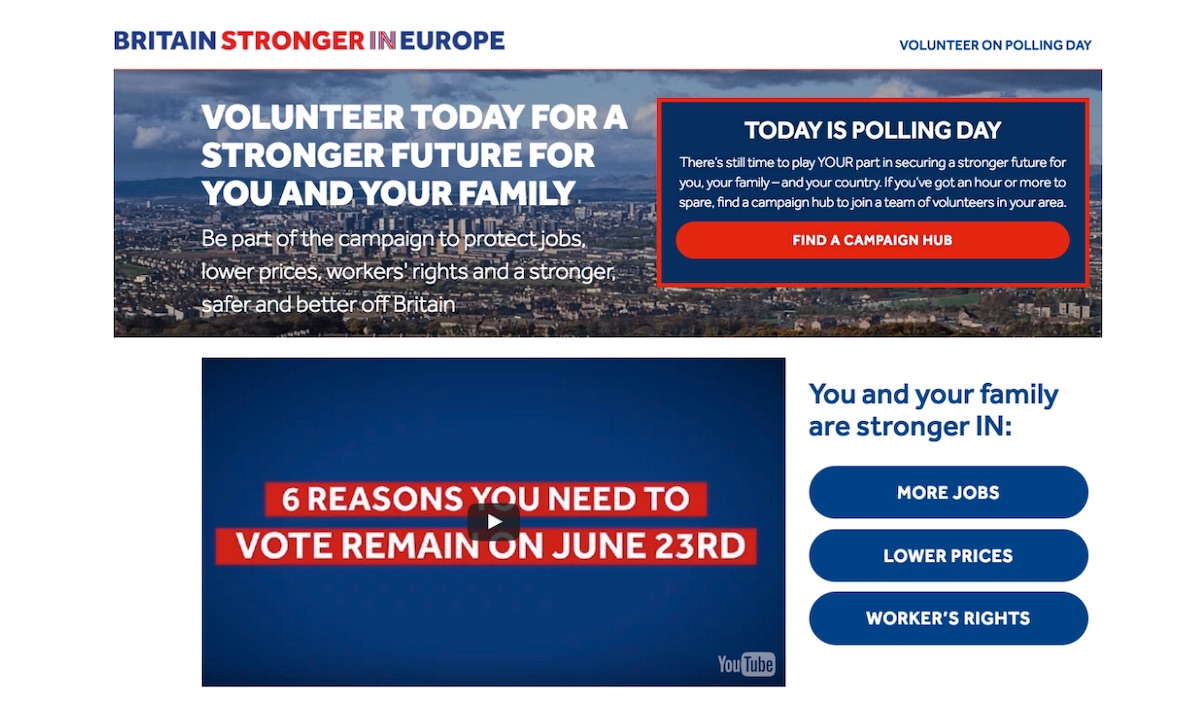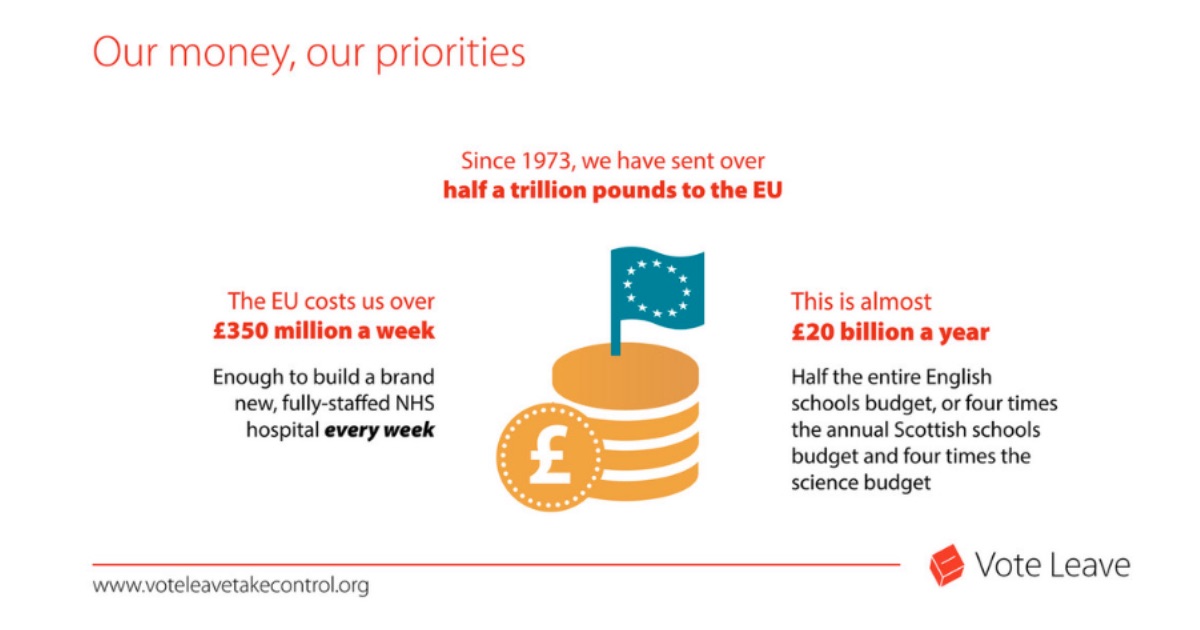Did Remain Lost the Brexit Vote Due to Messaging Errors?
Notwithstanding the obvious fact that it is a self-inflicted crisis, Brexit is certainly the biggest political challenge that Britain has faced this century. As British PM Boris Johnson lurches into a negotiation dead-end of his own making, it’s a fascinating event to safely observe from afar as an analysis of communication and messaging.
As the shock of the narrow and unexpected Leave election victory in June 2016 subsided, I wrote the following as a response to an Aberdeen Essentials post. I’m reposting it in light of the fact that the Day of Departure Reckoning (aka when Britain actually leaves) may happen by Halloween. Wouldn’t that be scary!
I hadn’t closely followed the Leave v. Remain debate, but was intrigued after the election to do a cursory analysis of their respective campaigns in terms of messaging. As I didn’t reside in the UK at the time, I relied on information I could find online. These are my thoughts and criticisms at the time.
Deconstructing Brexit Messaging
Despite overwhelming positives, I would argue that Remain lost the Brexit vote due to marketing and messaging errors in campaign strategy and execution.
I didn’t have a dog in the fight. However, simply based on comparing messaging, the Leave presentation deck and the Remain video, I would have voted Leave. Their messaging was far more convincing as far as presenting the upside of leaving versus the status quo of remaining.
The Remain messaging was really passive and obtuse. What does “You and your family are stronger IN” actually mean? I have a family and we’ve NEVER ONCE discussed our current status or future (hopes, dreams et al) in the context of strength. Strength doesn’t mean anything in the context of family and friends, unless in a literal sense like I need to invite four mates over to move the family piano this weekend. Stronger doesn’t imply a comparative upside in any meaningful way.
“Be part of the campaign to protect jobs, lower prices, workers’ rights and a stronger, safer and better off Britain.”

Who Forgot the Emotion? Anyone Seen It?
What the Remain side curiously and calamitously failed to do is 1. use emotionally connective language and 2. emphasize the negatives in clear consequential terms. “Be part of the campaign” doesn’t exactly connect in the same way as World War Two entreaties to buy war bonds or do your part by saving metals to contribute to the war effort.
Workers’ rights? That was a bit of an orphan idea, wasn’t it? Why was that even prioritized in the messaging hierarchy? What does it even mean? Trade unionism. Right to organize. More holiday time. Freedom from working with toxic chemicals.
An Ode to Lower Prices
If you’re going say that prices are and will continue to be lower, why not take the (normally logical) next step and point out the likely change if the other side wins. It’s not good enough to assume that people will connect the causality dots and understand that prices will soar. (A slide calculator would have been useful).
The Leave side presented a good argument for why Britain could politically leave the EU but still retain the economic benefits of trade with Europe. I didn’t see any convincing rebuttal from Remain. I think most UK residents who read the Leave claims would conclude that Denmark and Switzerland seem to be doing OK trading with European neighbors without being an EU member.

The Perils of Woulda, Shoulda, Coulda
This statement from the Remain website is also unconvincing:
“Economic experts including the Bank of England Governor say that if we left the EU our economy would be hit, and we could go back into recession.”
If he said it, print it.
“….we left the EU our economy would be hit.”
“…we could go back into recession.”
Both of these are really weak and completed unsupported by data, which I am 100% confident existed in projections inside the Bank of England. Much more convincing would have been to provide numbers, and sliding calculators that started with suggested changes in housing prices, petrol, holidays, packets of crisps – whatever is relevant. Have some outlying DEFCON 1 settings, too, on the edge so people could have estimated just for fun a purely hypothetical 2 trillion dollar fall in world stock markets.

If you’re going to use loss aversion as a reason to stay with the status quo, you really need to paint the alternative believably dark. Not in a fear-for-fear sake but compellingly substantiated using really simple messaging, and perhaps a few images of people and real-life. (There weren’t many non-stock pictures of people on the StrongerIn website.
Similarly, if you are going to play the hope card, at least make the reward look exciting. And try not to use conditional language; “If we left the free trade single market, businesses would have to pay tariffs.” Not “would”; “will” have to pay.
I could continue. It’s patently clear why communications academics in the UK and elsewhere will study why Brexit was a communications failure for years to come, some of whom, I’m sure, will earn at least masters degrees for their dissections. Overall, it was a really wishy-washy exercise in message development and delivery by the people running Remain marketing. How did they get the job?
Additional Reading
Leave Campaign Won Because it Followed KISS: Keep it Simple Stupid
The campaign I suspect most professional marketing and ad people backed demonstrated so few basic marketing skills.
Why Couldn’t Adland Sell Remain to the Public?
With such a superior product, writes Paul Burke, how could the strategy for selling it go so spectacularly wrong?
Brexit vote Shows Catastrophic Failure of Communications
The referendum result is a story of many parts but one of them is certainly the catastrophic failure of the communications industry to mount a coherent and powerful pro-EU message.
A Nation Divided: What Marketers Must Learn From the Brexit Vote
It’s fair to say that no-one’s Cannes hangover was improved by the Brexit news this morning. The collective shock and angst brought the industry crashing to Earth as the Lions wound down
Want To Add Some Marketing Expertise to Your Team?
FLEXIBILITY FROM SHORT-TERM TO LONGER ENGAGEMENTS
We’re highly flexible. Almost to a pilates level. Whether you need help for a few days with SEO or a PPC audit, or need several months of content marketing leadership and creativity, we can help. Because that’s what we do.





